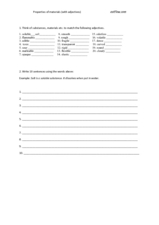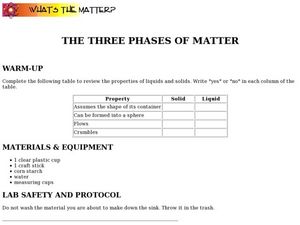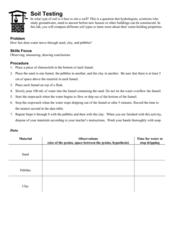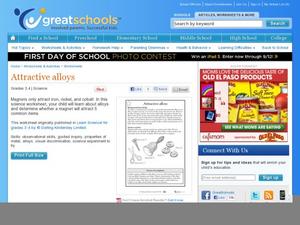University of Georgia
What's So Special about Bottled Drinking Water?
Is artesian water designed to be better, or is it just from wells similar to those in the city of Artesium? This experiment looks at many different types of bottled waters, including artesian. Using a soap mixture, scholars test to see...
Curated OER
Call Me Bond, Hydrogen Bond
As amazing as James Bond is, the surface tension of water does not allow him to walk on it! For this series of little lab activities, physical scientists play with the properties of water due to the hydrogen bonds and resulting polarity....
Curated OER
The Effect of Dissolved Salt on the Boiling Point of Water
Explore the properties of solutions with a lab activity. Chemistry fans determine the boiling point of water, add salt to create a solution, and then repeat the process four more times. They design their own data table and then graph the...
Curated OER
Properties of Materials (with adjectives)
Help your students write descriptive lab reports! Designed for ESL students but useful for mainstreamed kids as well, the activity prompts students to think of substances that match twenty given adjectives ("salt" for "soluble," for...
Teach Engineering
Density Column Lab - Part 1
Mass and density — aren't they the same thing? This activity has groups use balance beams and water displacement to measure several objects. The pupils use the measurements to calculate the density of the objects.
It's About Time
Properties of Matter
Never trust an atom; they make up everything! Young chemists make modeling dough and add another ingredient to change the properties. Scholars then compare the properties of emulsion to composite materials. A reading passage and analysis...
Teach Engineering
Density and Miscibility
The liquids did not mix — so what do density columns have to do with it? The seventh part in a series of nine provides the theoretical explanation of why density columns do not mix. The lesson covers the topics related to...
Curated OER
Ionic vs. Covalent Compounds Lab
In this ionic and covalent compound learning exercise, learners investigate the properties of three unknown substances in order to determine if they are ionic or covalent compounds. They write conclusions about their results.
Creative Chemistry
Displacement Reactions of the Halogens
During this lab activity, chemists discover the reactivities of chlorine, bromine, and iodine as examples of the halogens. They use a displacement reaction as a test by adding other compounds and observing for a color change. The lab...
Teach Engineering
Density Column Lab - Part 2
Groups suspend objects within layers of liquids to determine the densities of different liquids and compare them to the densities of objects calculated in Part 1. The groups then carefully test their calculations by layering the...
Pingry School
Qualitative Analysis of Eleven Household Chemicals
Chemical and physical properties give compounds an identity. Learners use the identity of a compound to predict what it is. By performing different tests like solubility, flame, heat, and reactions, individuals attempt to identify an...
Curated OER
Solutions, Suspensions, & Colloids Lab
In this solutions, suspension and colloid worksheet, students complete a lab experiment in order to determine if a given mixture is a solution, suspension or colloid. They are given six vials and they record their observations of each...
Curated OER
Cross-Linked Polymer Lab
In this polymer instructional activity, students make two types of cross linked polymers and they test their physical properties. These include their response to agitation, stretchability, viscosity, and resilience.
Curated OER
Chemical and Physical Changes Lab
In this chemical and physical change learning exercise, students conduct a variety of experiments with unknown solutions and make observations. Students determine if the properties of the solutions have changed and if there is...
Curated OER
Soil Porosity, Moisture Content, pH, and Density
This lab activity does not have to be done with AP environmental scientists. It can also be done with middle to high school earth scientists. The procedures aren't complex. Learners determine the density of dry and wet sand in order to...
Curated OER
The Three Phases of Matter
To study the phases of matter, students complete an experiment including water and corn starch and answer six short answer questions about the states of matter the observed.
Curated OER
pH Pre-Lab: Acids and Bases
In this chemistry lab, students determine whether or not their saliva is acidic, basic, or neutral. After completing their test, they answer 6 analysis questions.
Curated OER
Determination of the Physical Properties of Dietary Fibers
For this dietary fibers worksheet, students compare and contrast the properties of different fibers: cellulose, hemicellulose, pectin, guar, agar, and xanthan gum. This worksheet has 5 short answer questions.
Curated OER
Soil Testing
Earth science learners experiment with the water-holding properties of sand, pebbles, and clay. They apply their findings to the building of a well. This activity is engaging and tactile, and it demonstrates the importance of considering...
Curated OER
Grow an Alum Crystal
What an exciting lab experiment to conduct with your high school chemistry class! Crystals are formed naturally in the environment. However, allow your blossoming chemists to create their own unique crystals using alum and...
Curated OER
More on Conduction and Convection
Why do some items feel colder when they are the same temperature? How should you keep your soda cold? What makes the wind blow? These are just some of the things middle schoolers discover when completing a lesson on...
Beyond Benign
Green"er" Precipitation Reaction
All sodium carbonate may not have the same amount of carbonate, but it should have the same percent. Learners write and balance an equation to predict the chemical reaction between sodium carbonate and zinc acetate. Through the lab...
Curated OER
Attractive Alloys
Include a lab about alloys and magnets in your fourth grade science lesson. Young scientists read the necessary background knowledge about alloys, then choose which objects (a screw, a bell, scissors, or coins) will be attracted to...
Curated OER
Salinity Lab
In this salinity worksheet, students simulate conditions of salt and fresh water mixing and observe the various densities of these solutions based on their salinity.























